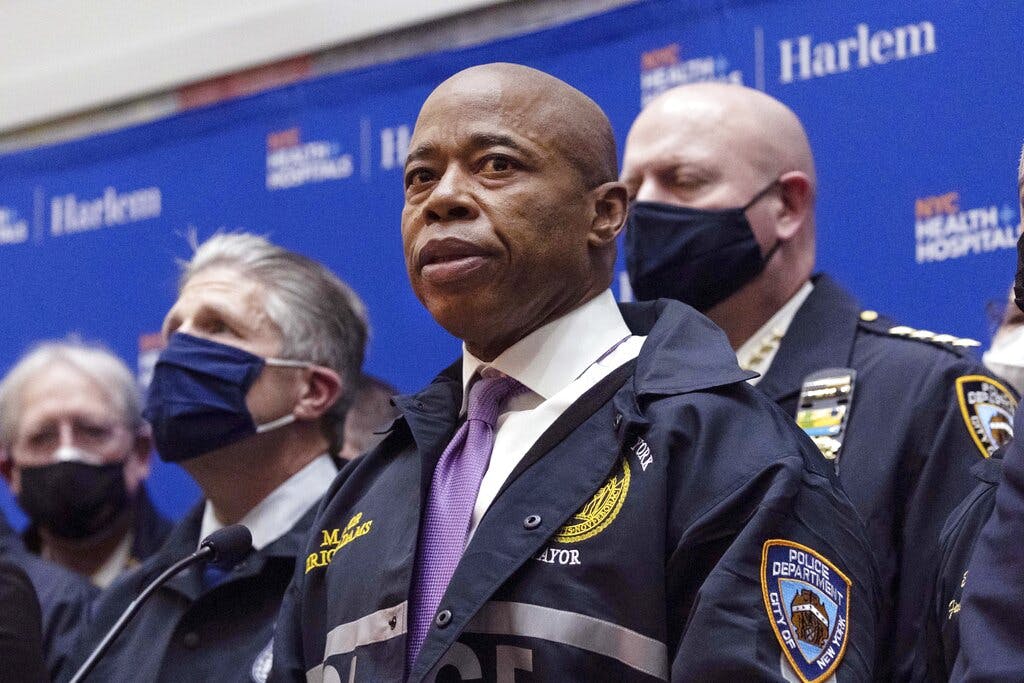Some Are Already Blaming Mayor Adams as New York Fails To Show Progress on Crime
The silver lining in April was a drop in the numbers of homicides and shootings.

New York City’s crime stats are in for April and the soaring numbers appear to be souring residents’ opinions of the new mayor, at least according to a new Quinnipiac poll. Some analysts say it may be too early to blame Mayor Adams.
According to the NYPD, April saw a 34.2 percent increase in the overall crime index compared with April 2021, following a 36.5 percent increase in March.
That rise was driven by a 43.5 percent increase in grand larceny, a 41.5 percent increase in robbery, and a 39.4 percent increase in burglaries, police said.
At the same time, the city saw a 38 percent decrease in homicides and a 29.1 percent drop in shootings compared to April 2021. This follows a 15.8 percent decrease in homicides in March, when there was also a 16.2 percent increase in shootings.
Despite victories in reducing some of the most serious offenses, the crime rate throughout 2022 has stood between 30 percent and 40 percent higher than 2021, when rates were already at elevated levels compared with 2019.
“We are seeing movement and the crime numbers from yesterday reflect that with homicides, shootings, rapes, and hate crimes all down,” the mayor’s press secretary, Fabien Levy, told the Sun. “Public safety has been Mayor Adams’ top priority since day one.”
Observers are divided as to what is driving the increase. Some blame New York’s 2019 bail reform effort while others point to the pandemic’s economic fallout and resulting social unrest.
A Manhattan Institute fellow, Charles Lehman, argues that “month to month comparisons are not that helpful in discerning the broader trends in crime.
“As the city comes back those opportunities for larceny return,” he said. “Covid was much worse in 2021 than it was in 2022 and that could have had a more depressant effect.”
The city’s police commissioner Keechant Sewell, and others in the Adams administration argue that most of the city’s crime is committed by a small number of people — a sector of the population they say they are targeting.
Ms. Sewell credited April’s positive numbers to “a concentrated effort to take even more illegal firearms out of the hands of criminals, and a renewed attention to persistent quality-of-life offenses.”
Mr. Lehman commended this strategy: “People who are trapped in gang life — who are shot and shooting — they are engaged in more violence than they were before 2020.”
While he was hesitant to blame the city’s persistent crime woes on the Adams administration, arguing that new policies — like March’s rollout of the anti-gun unit — have not yet had time to take effect, voters already appear to be souring on the new mayor.
A Quinnipiac poll released Thursday found that Mr. Adams enjoyed only a 43 percent approval rating with 37 percent disapproving of the new mayor. A fifth of voters offered “no opinion.”
That’s down from a 46 percent approval rating and 27 percent disapproval in February.
“Mayor Adams gets a positive score on his job performance, but it’s tepid. The biggest weight on his numbers: crime. It’s by far the most urgent issue and voters are holding him accountable,” a Quinnipiac University polling analyst, Mary Snow, said.
Analyst Rafael Mangual says the progress the Adams administration has made on shootings and homicides has been tempered by other categories of crime worsening.
“We should be very concerned by the much larger increases in other crime categories like larcenies, robberies, and burglaries, which indicate that the 2020/21 shooting/homicide numbers were not blips,” he said.
The public’s sense that four months have made little difference plays out in polling. Ms. Snow noted the “increase in major crimes” as being responsible for a slide in the public’s confidence.
“I think the answer is that we can hold the administration responsible starting now, “ Mr. Mangual argues. “We just have to be cognizant of what the administration can and cannot control.”
With the summer and its historically higher crimes rates ahead, Mr. Adams is facing scrutiny from the public in harsh conditions. The Citizens Crime Commission president, Richard Aborn, contends that passing judgment may be premature.
“I don’t think it’s reasonable to hold him accountable after four months, it’s too short of a time,” Mr. Aborn told the Sun. He said a more appropriate timeline would be “between six and nine months.”
“If they can keep the numbers from rising in the summer, that will be a major accomplishment,” he said.
“Mayor Adams is laser-focused on reversing the failures of the previous administration,” Mr. Levy told the Sun. “But reducing crime in the city won’t happen overnight.”

